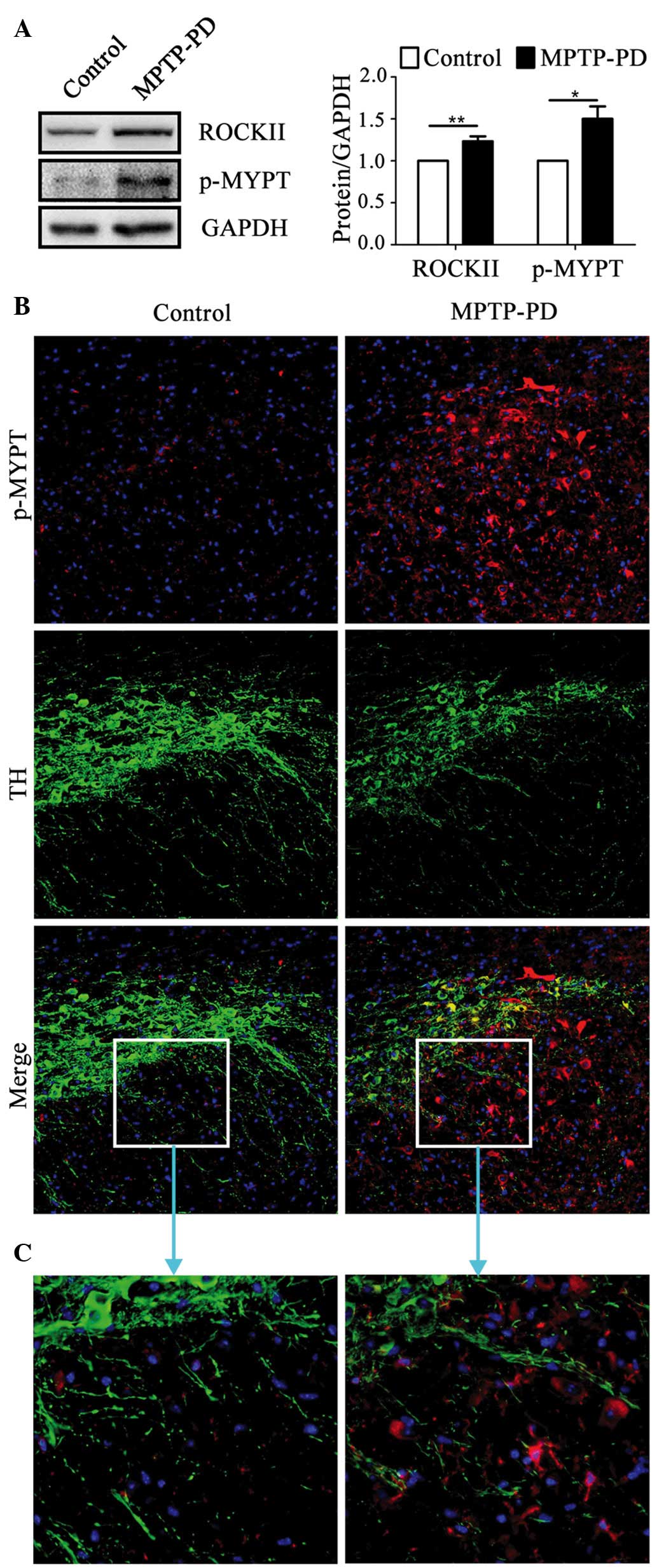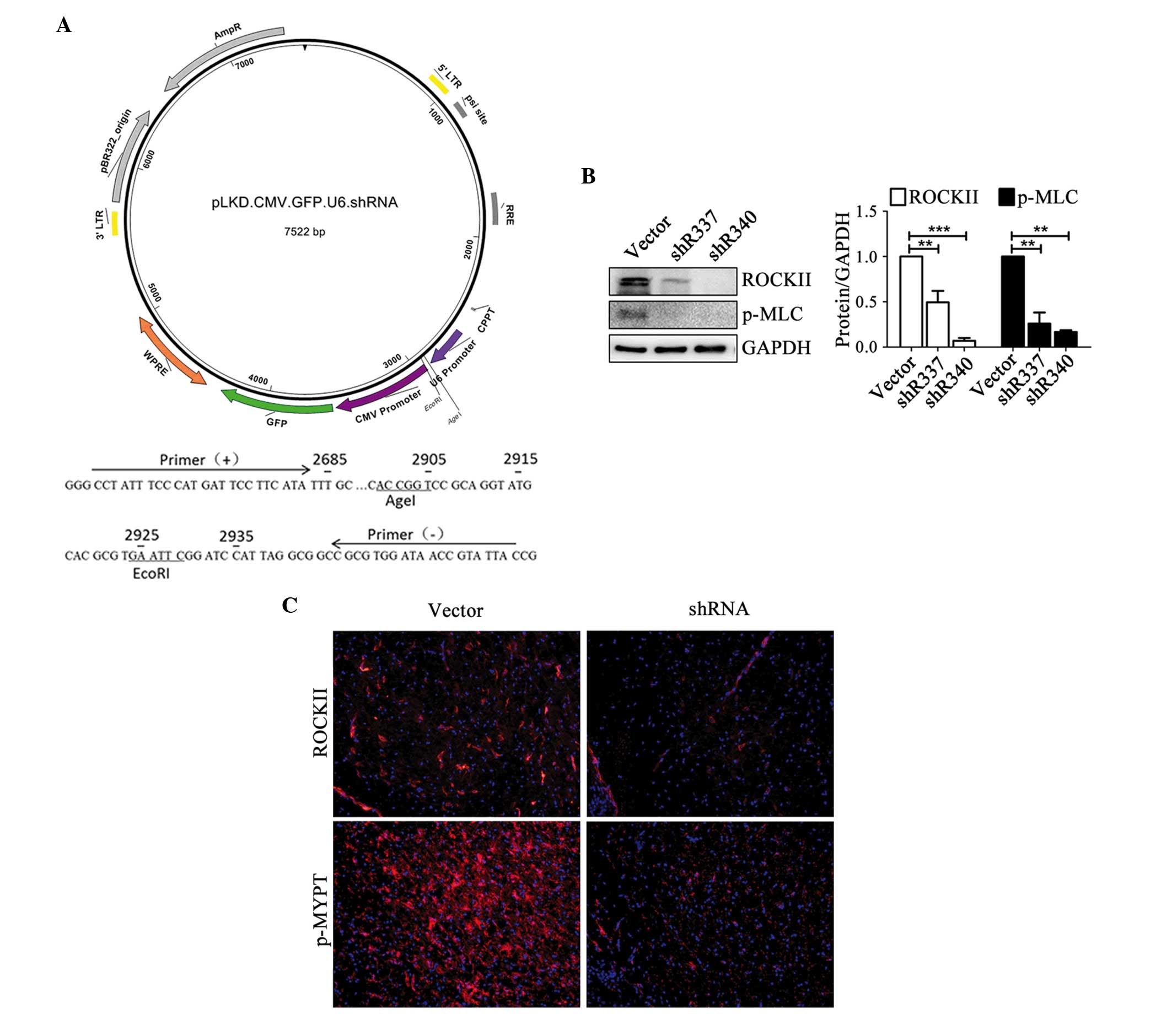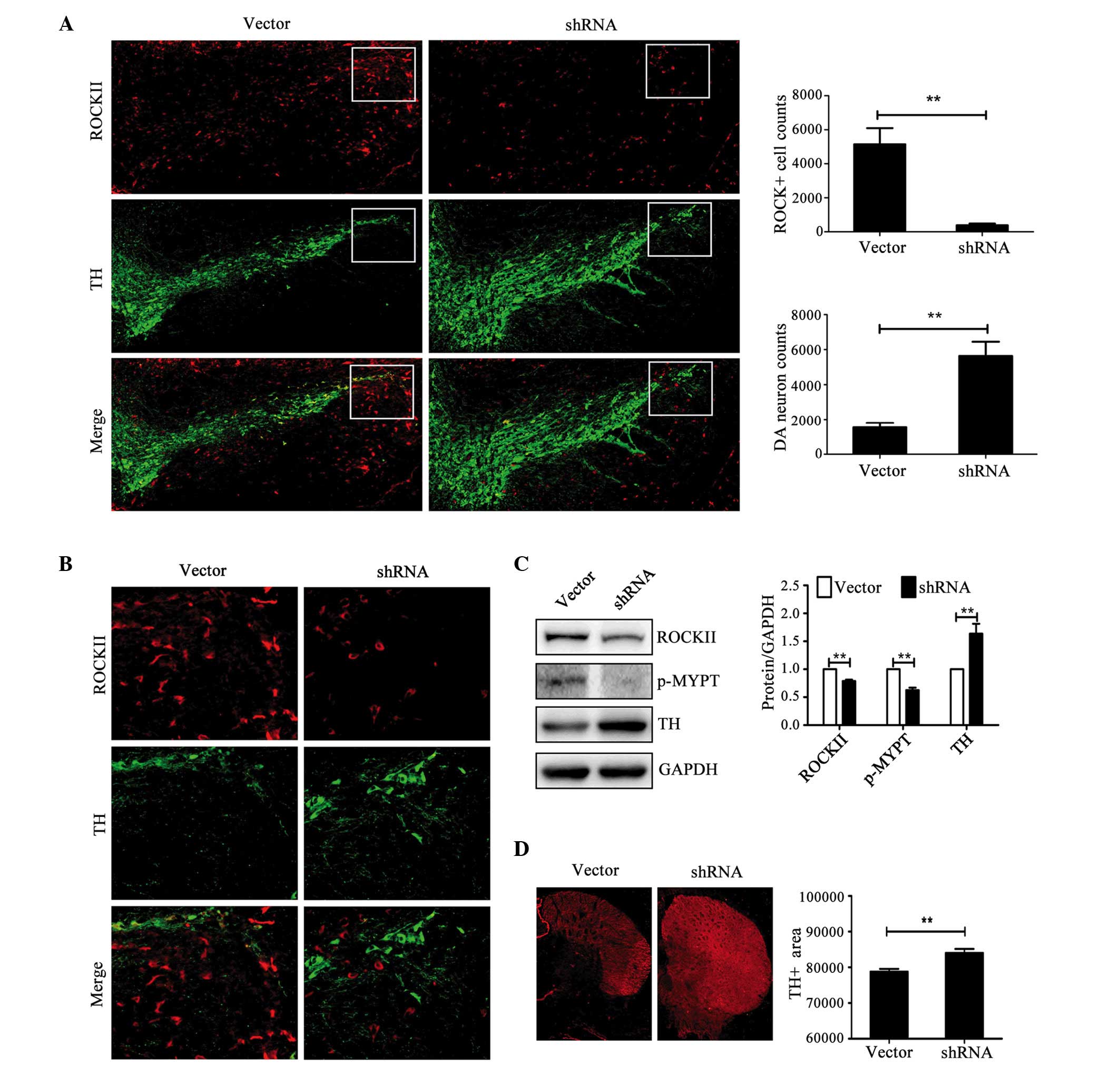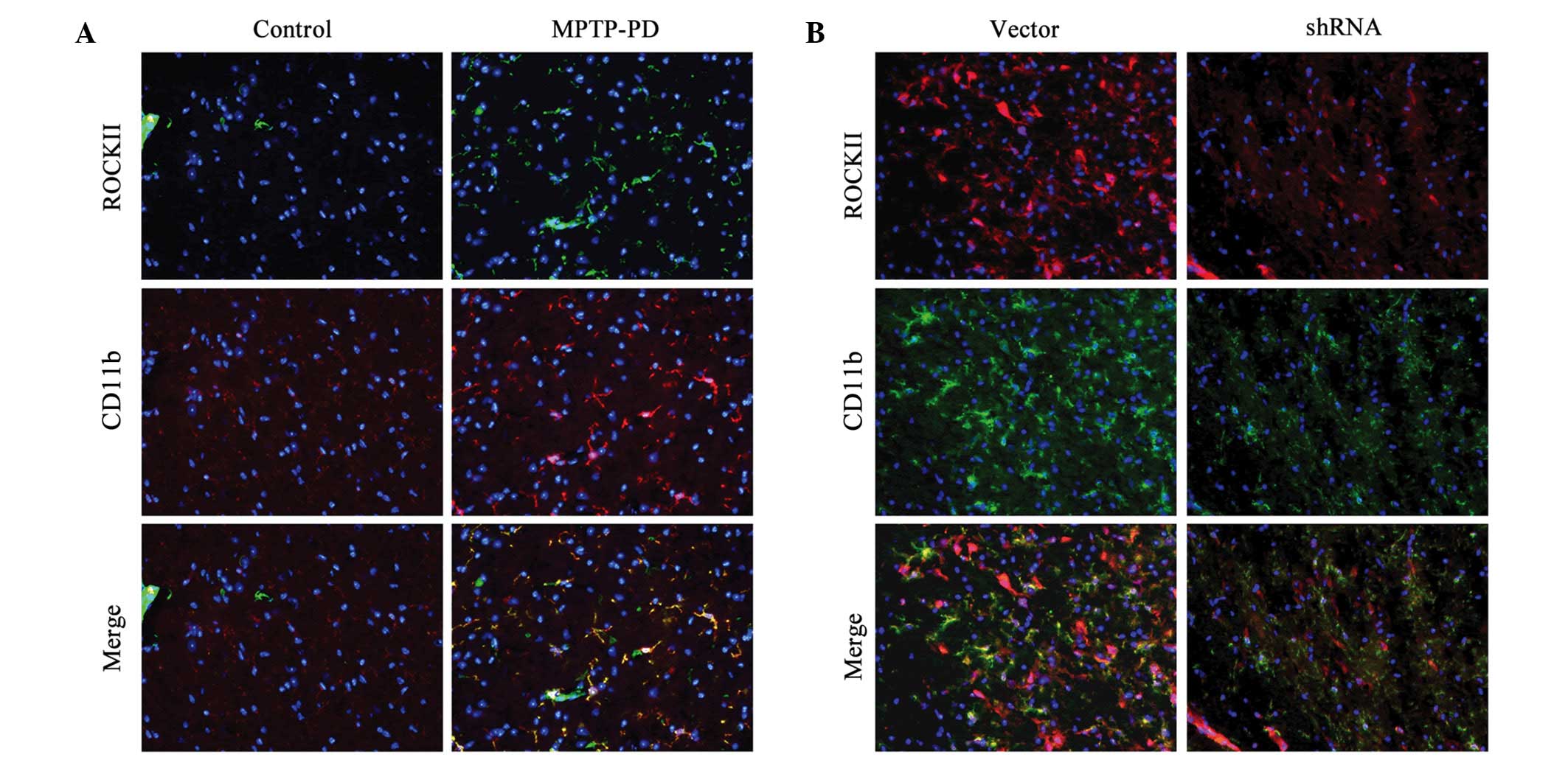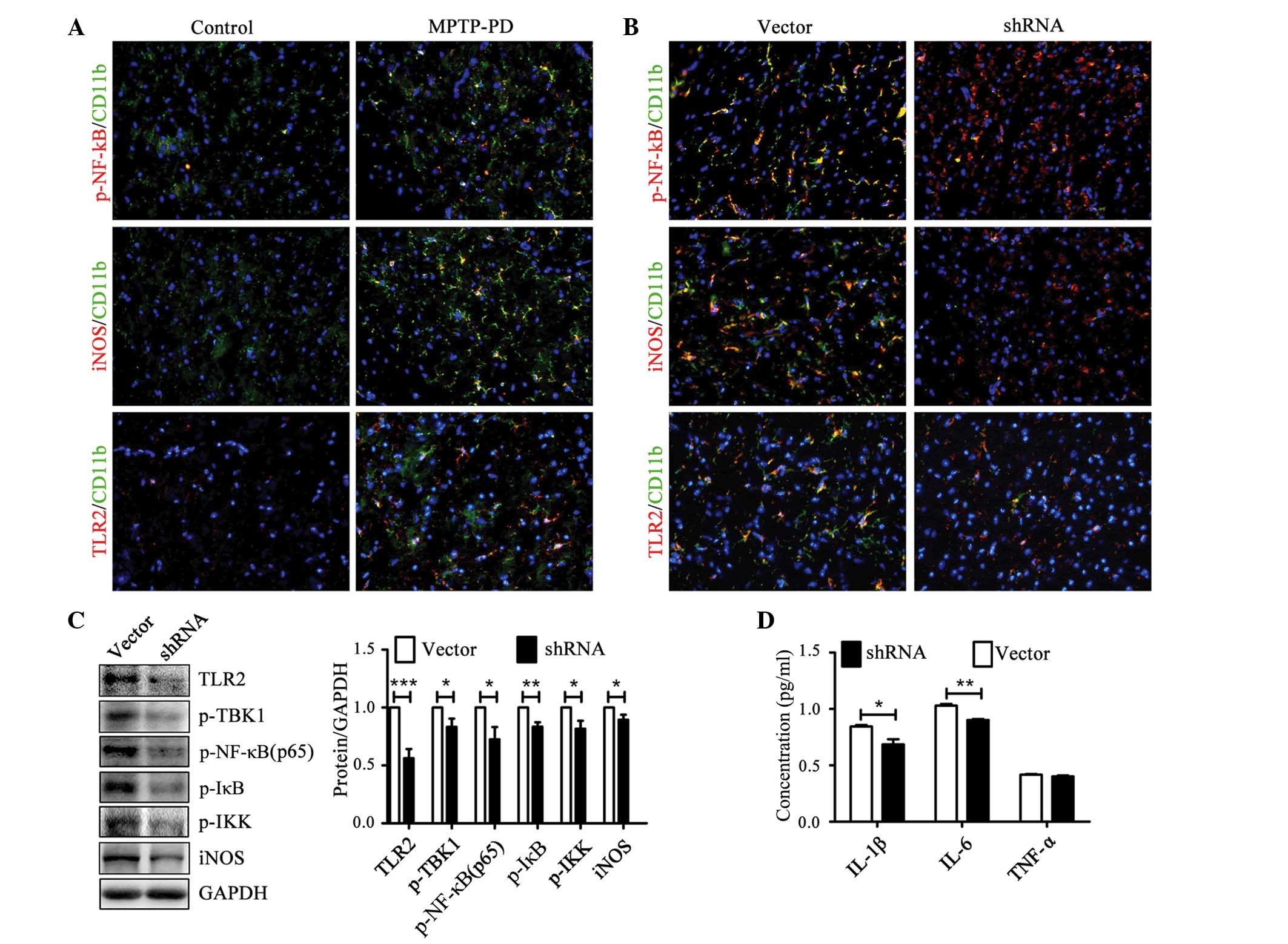|
1
|
Dawson TM and Dawson VL: Molecular
pathways of neurodegeneration in Parkinson's disease. Science.
302:819–822. 2003. View Article : Google Scholar : PubMed/NCBI
|
|
2
|
Fox R, Nhan TQ, Law GL, Morris DR, Liles
WC and Schwartz SM: PSGL-1 and mTOR regulate translation of ROCK-1
and physiological functions of macrophages. EMBO J. 26:505–515.
2007. View Article : Google Scholar : PubMed/NCBI
|
|
3
|
Yoneda A, Multhaupt HA and Couchman JR:
The Rho kinases I and II regulate different aspects of myosin II
activity. J Cell Biol. 170:443–453. 2005. View Article : Google Scholar : PubMed/NCBI
|
|
4
|
Watanabe K, Ueno M, Kamiya D, Nishiyama A,
Matsumura M, Wataya T, Takahashi JB, Nishikawa S, Nishikawa S,
Muguruma K and Sasai Y: A ROCK inhibitor permits survival of
dissociated human embryonic stem cells. Nat Biotechnol. 25:681–686.
2007. View
Article : Google Scholar : PubMed/NCBI
|
|
5
|
Mong PY and Wang Q: Activation of Rho
kinase isoforms in lung endothelial cells during inflammation. J
Immunol. 182:2385–2394. 2009. View Article : Google Scholar : PubMed/NCBI
|
|
6
|
Aihara M, Dobashi K, Iizuka K, Nakazawa T
and Mori M: Comparison of effects of Y-27632 and Isoproterenol on
release of cytokines from human peripheral T cells. Int
Immunopharmacol. 3:1619–1625. 2003. View Article : Google Scholar : PubMed/NCBI
|
|
7
|
Aihara M, Dobashi K, Iizuka K, Nakazawa T
and Mori M: Effect of Y-27632 on release of cytokines from
peripheral T cells in asthmatic patients and normal subjects. Int
Immunopharmacol. 4:557–561. 2004. View Article : Google Scholar : PubMed/NCBI
|
|
8
|
Henry PJ, Mann TS and Goldie RG: A rho
kinase inhibitor, Y-27632 inhibits pulmonary eosinophilia,
bronchoconstriction and airways hyperresponsiveness in allergic
mice. Pulm Pharmacol Ther. 18:67–74. 2005. View Article : Google Scholar : PubMed/NCBI
|
|
9
|
Song Y, Chen X, Wang LY, Gao W and Zhu MJ:
Rho kinase inhibitor fasudil protects against β-amyloid-induced
hippocampal neurodegeneration in rats. CNS Neurosci Ther.
19:603–610. 2013. View Article : Google Scholar : PubMed/NCBI
|
|
10
|
Villar-Cheda B, Dominguez-Meijide A,
Joglar B, Rodriguez-Perez AI, Guerra MJ and Labandeira-Garcia JL:
Involvement of microglial RhoA/Rho-kinase pathway activation in the
dopaminergic neuron death. Role of angiotensin via angiotensin type
1 receptors. Neurobiol Dis. 47:268–279. 2012. View Article : Google Scholar : PubMed/NCBI
|
|
11
|
Tönges L, Frank T, Tatenhorst L, Saal KA,
Koch JC, Szego ÉM, Bähr M, Weishaupt JH and Lingor P: Inhibition of
rho kinase enhances survival of dopaminergic neurons and attenuates
axonal loss in a mouse model of Parkinson's disease. Brain.
135:3355–3370. 2012. View Article : Google Scholar : PubMed/NCBI
|
|
12
|
Mueller BK, Mack H and Teusch N: Rho
kinase, a promising drug target for neurological disorders. Nat Rev
Drug Discov. 4:387–398. 2005. View
Article : Google Scholar : PubMed/NCBI
|
|
13
|
Tokuoka H, Muramatsu S, Sumi-Ichinose C,
Sakane H, Kojima M, Aso Y, Nomura T, Metzger D and Ichinose H:
Compensatory regulation of dopamine after ablation of the tyrosine
hydroxylase gene in the nigrostriatal projection. J Biol Chem.
286:43549–43558. 2011. View Article : Google Scholar : PubMed/NCBI
|
|
14
|
Matsuura K, Kabuto H, Makino H and Ogawa
N: Pole test is a useful method for evaluating the mouse movement
disorder caused by striatal dopamine depletion. J Neurosci Methods.
73:45–48. 1997. View Article : Google Scholar : PubMed/NCBI
|
|
15
|
Bouet V, Boulouard M, Toutain J, Divoux D,
Bernaudin M, Schumann-Bard P and Freret T: The adhesive removal
test: A sensitive method to assess sensorimotor deficits in mice.
Nat Protoc. 4:1560–1564. 2009. View Article : Google Scholar : PubMed/NCBI
|
|
16
|
Ojo B, Rezaie P, Gabbott PL, Cowely TR,
Medvedev NI, Lynch MA and Stewart MG: A neural cell adhesion
molecule-derived peptide, FGL, attenuates glial cell activation in
the aged hippocampus. Exp Neurol. 232:318–328. 2011. View Article : Google Scholar : PubMed/NCBI
|
|
17
|
Zaborszky L and Vadasz C: The midbrain
dopaminergic system: Anatomy and genetic variation in dopamine
neuron number of inbred mouse strains. Behav Genet. 31:47–59. 2001.
View Article : Google Scholar : PubMed/NCBI
|
|
18
|
Zhang H, Li Y, Yu J, Guo M, Meng J, Liu C,
Xie Y, Feng L, Xiao B and Ma C: Rho kinase inhibitor fasudil
regulates microglia polarization and function.
Neuroimmunomodulation. 20:313–322. 2013.PubMed/NCBI
|
|
19
|
Grassie ME, Moffat LD, Walsh MP and
MacDonald JA: The myosin phosphatase targeting protein (MYPT)
family: A regulated mechanism for achieving substrate specificity
of the catalytic subunit of protein phosphatase type 1δ. Arch
Biochem Biophys. 510:147–159. 2011. View Article : Google Scholar : PubMed/NCBI
|
|
20
|
Herskowitz JH, Feng Y, Mattheyses AL,
Hales CM, Higginbotham LA, Duong DM, Montine TJ, Troncoso JC,
Thambisetty M, Seyfried NT, et al: Pharmacologic inhibition of
ROCK2 suppresses amyloid-β production in an Alzheimer's disease
mouse model. J Neurosci. 33:19086–19098. 2013. View Article : Google Scholar : PubMed/NCBI
|
|
21
|
Rodriguez-Perez AI, Dominguez-Meijide A,
Lanciego JL, Guerra MJ and Labandeira-Garcia JL: Inhibition of Rho
kinase mediates the neuroprotective effects of estrogen in the MPTP
model of Parkinson's disease. Neurobiol Dis. 58:209–219. 2013.
View Article : Google Scholar : PubMed/NCBI
|
|
22
|
Noma K, Kihara Y and Higashi Y: Striking
crosstalk of ROCK signaling with endothelial function. J Cardiol.
60:1–6. 2012. View Article : Google Scholar : PubMed/NCBI
|
|
23
|
Barcia C, Ros CM, Annese V, Carrillo-de
Sauvage MA, Ros-Bernal F, Gómez A, Yuste JE, Campuzano CM, de
Pablos V, Fernandez-Villalba E and Herrero MT: ROCK/Cdc42-mediated
microglial motility and gliapse formation lead to phagocytosis of
degenerating dopaminergic neurons in vivo. Sci Rep. 2:8092012.
View Article : Google Scholar : PubMed/NCBI
|
|
24
|
Satoh K, Fukumoto Y and Shimokawa H:
Rho-kinase: Important new therapeutic target in cardiovascular
diseases. Am J Physiol Heart Circ Physiol. 301:H287–H296. 2011.
View Article : Google Scholar : PubMed/NCBI
|
|
25
|
Wu KY, Hengst U, Cox LJ, Macosko EZ,
Jeromin A, Urquhart ER and Jaffrey SR: Local translation of RhoA
regulates growth cone collapse. Nature. 436:1020–1024. 2005.
View Article : Google Scholar : PubMed/NCBI
|
|
26
|
Liu CY, Guo SD, Yu JZ, Li YH, Zhang H,
Feng L, Chai Z, Yuan HJ, Yang WF, Feng QJ, et al: Fasudil mediates
cell therapy of EAE by immunomodulating encephalomyelitic T cells
and macrophages. Eur J Immunol. 45:142–152. 2015. View Article : Google Scholar : PubMed/NCBI
|
|
27
|
McGeer PL, Itagaki S, Boyes BE and McGeer
EG: Reactive microglia are positive for HLA-DR in the substantia
nigra of Parkinson's and Alzheimer's disease brains. Neurology.
38:1285–1291. 1988. View Article : Google Scholar : PubMed/NCBI
|
|
28
|
Brochard V, Combadière B, Prigent A,
Laouar Y, Perrin A, Beray-Berthat V, Bonduelle O, Alvarez-Fischer
D, Callebert J, Launay JM, et al: Infiltration of CD4+ lymphocytes
into the brain contributes to neurodegeneration in a mouse model of
Parkinson disease. J Clin Invest. 119:182–192. 2009.PubMed/NCBI
|
|
29
|
Boka G, Anglade P, Wallach D, Javoy-Agid
F, Agid Y and Hirsch EC: Immunocytochemical analysis of tumor
necrosis factor and its receptors in Parkinson's disease. Neurosci
Lett. 172:151–154. 1994. View Article : Google Scholar : PubMed/NCBI
|
|
30
|
Mogi M, Harada M, Riederer P, Narabayashi
H, Fujita K and Nagatsu T: Tumor necrosis factor-alpha (TNF-alpha)
increases both in the brain and in the cerebrospinal fluid from
parkinsonian patients. Neurosci Lett. 165:208–210. 1994. View Article : Google Scholar : PubMed/NCBI
|
|
31
|
Mogi M, Harada M, Kondo T, Riederer P,
Inagaki H, Minami M and Nagatsu T: Interleukin-1 beta,
interleukin-6, epidermal growth factor and transforming growth
factor-alpha are elevated in the brain from parkinsonian patients.
Neurosci Lett. 180:147–150. 1994. View Article : Google Scholar : PubMed/NCBI
|
|
32
|
Mogi M, Kondo T, Mizuno Y and Nagatsu T:
p53 protein, interferon-gamma, and NF-kappaB levels are elevated in
the parkinsonian brain. Neurosci Lett. 414:94–97. 2007. View Article : Google Scholar : PubMed/NCBI
|
|
33
|
Knott C, Stern G and Wilkin GP:
Inflammatory regulators in Parkinson's disease: iNOS, lipocortin-1,
and cyclooxygenases-1 and −2. Mol Cell Neurosci. 16:724–739. 2000.
View Article : Google Scholar : PubMed/NCBI
|
|
34
|
Ouchi Y, Yoshikawa E, Sekine Y,
Futatsubashi M, Kanno T, Ogusu T and Torizuka T: Microglial
activation and dopamine terminal loss in early Parkinson's disease.
Ann Neurol. 57:168–175. 2005. View Article : Google Scholar : PubMed/NCBI
|
|
35
|
Gerhard A, Pavese N, Hotton G, Turkheimer
F, Es M, Hammers A, Eggert K, Oertel W, Banati RB and Brooks DJ: In
vivo imaging of microglial activation with [11C](R)-PK11195 PET in
idiopathic Parkinson's disease. Neurobiol Dis. 21:404–412. 2006.
View Article : Google Scholar : PubMed/NCBI
|
|
36
|
Liberatore GT, Jackson-Lewis V, Vukosavic
S, Mandir AS, Vila M, McAuliffe WG, Dawson VL, Dawson TM and
Przedborski S: Inducible nitric oxide synthase stimulates
dopaminergic neurodegeneration in the MPTP model of Parkinson
disease. Nat Med. 5:1403–1409. 1999. View
Article : Google Scholar : PubMed/NCBI
|
|
37
|
Teismann P, Tieu K, Choi DK, Wu DC, Naini
A, Hunot S, Vila M, Jackson-Lewis V and Przedborski S:
Cyclooxygenase-2 is instrumental in Parkinson's disease
neurodegeneration. Proc Natl Acad Sci USA. 100:5473–5478. 2003.
View Article : Google Scholar : PubMed/NCBI
|
|
38
|
Cicchetti F, Lapointe N, Roberge-Tremblay
A, Saint-Pierre M, Jimenez L, Ficke BW and Gross RE: Systemic
exposure to paraquat and maneb models early Parkinson's disease in
young adult rats. Neurobiol Dis. 20:360–371. 2005. View Article : Google Scholar : PubMed/NCBI
|
|
39
|
Noelker C, Morel L, Lescot T, Osterloh A,
Alvarez-Fischer D, Breloer M, Henze C, Depboylu C, Skrzydelski D,
Michel PP, et al: Toll like receptor 4 mediates cell death in a
mouse MPTP model of Parkinson disease. Sci Rep. 3:13932013.
View Article : Google Scholar : PubMed/NCBI
|
|
40
|
Kim WG, Mohney RP, Wilson B, Jeohn GH, Liu
B and Hong JS: Regional difference in susceptibility to
lipopolysaccharide-induced neurotoxicity in the rat brain: Role of
microglia. J Neurosci. 20:6309–6316. 2000.PubMed/NCBI
|
|
41
|
Wang C, Wang H, Luo J, Hu Y, Wei L, Duan M
and He H: Selenium deficiency impairs host innate immune response
and induces susceptibility to Listeria monocytogenes infection. BMC
Immunol. 10:552009. View Article : Google Scholar : PubMed/NCBI
|















